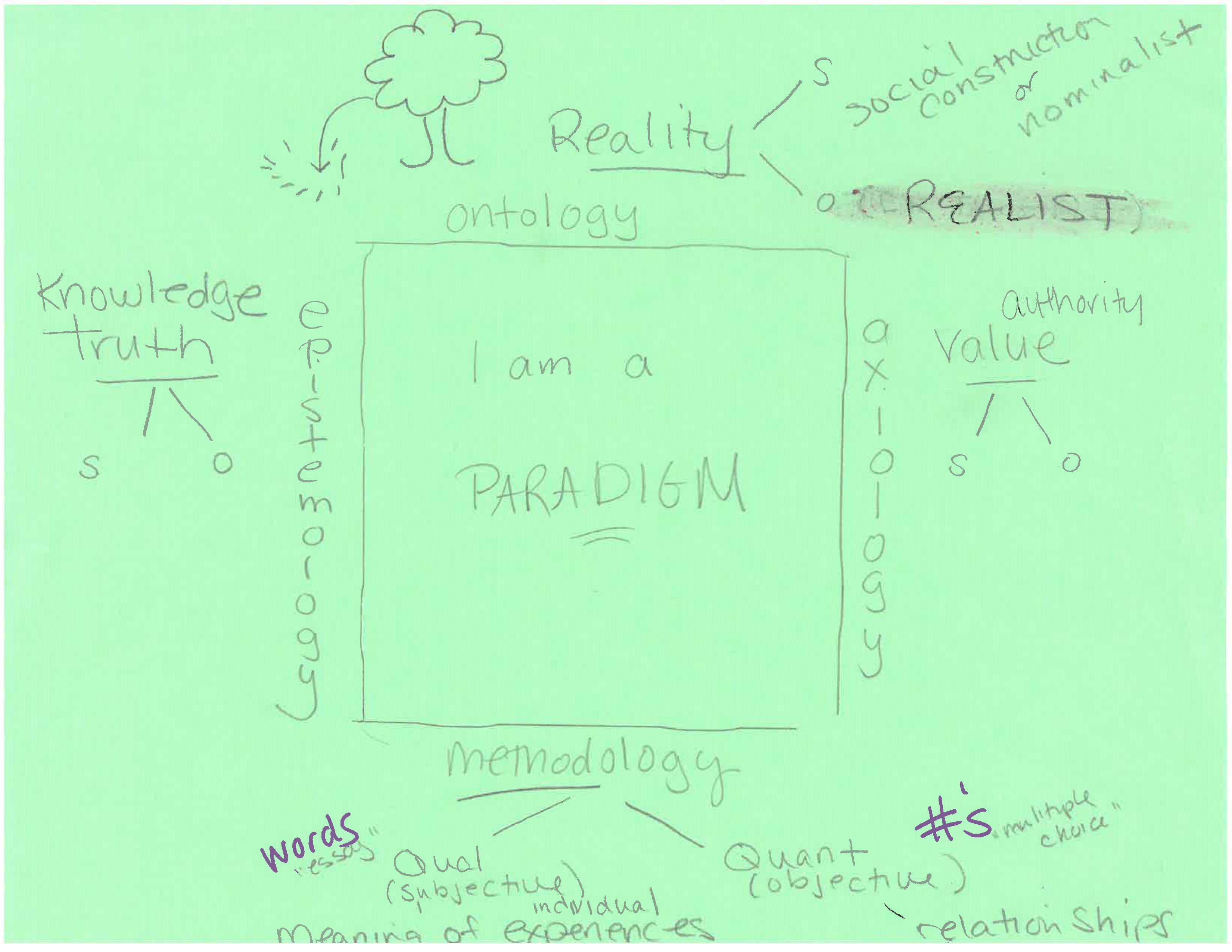Unit 6: Don’t be bashful- interrogate that primary research!
15 The Dreaded Ologies — An Introduction (with a side of paradigm)
Real Talk
This is the part of the course where things start to get a little more complicated. If we’re moving through the average journal article, and we’ve talked (at length ;)) about the first “half”[1] of an average SS Com article, it would make sense to talk about “Research Questions and Hypotheses” next. However, we really ought to talk about Methodology first, and although we briefly covered these concepts in our Basic Methods Vocab lesson, we really ought to dive deeper into the ologies pool before we dig in to METHODology – just to give some context. And if we’re talking about ologies then we really ought to talk about paradigms, just a smidge, for overall context, because at the end of the day, the paradigm is made up of the ologies and has a BIG say in the questions asked, the way they’re asked and answered, and how they show up in publications. Basically, there isn’t a good way to order these things sequentially. Thus, my advice to you is to circle through these chapters and videos in the next few units. Read/watch them in order, read/watch them again in another order. Use your notes to think about how these concepts are interrelated. Rinse, recycle, repeat.
Do you remember when you asked me to identify the concepts that students most struggled with in this course? And we didn’t really have any up until this point? Buckle up kids, it was all fun and games until we got here. We hit it. We found it. These are the concepts that tend to get a little tricky. But, hey, it’s ok. It’s not all bad. Some even say that feeling uncomfortable is the key to success… Here’s what your student textbook authors have to say about -ologies-:
Learning Objectives
OLOGIES! You should be able to distinguish between the four types and describe what a paradigm is.
The Dreaded Ologies
This chapter is all about “Olgies” or in other words “the study of…”. We will discuss four ologies in this unit which include Ontology, Epistemology, Axiology, and Methodology. At first they may seem confusing, but by the end of the semester you will be an expert!
First we will learn about “Ontology” or the study of the nature of reality.
The Spectrum of Ontology
Realism ↔ Nominalism ↔ Social Constructionism
Realism claims something is real because it exists physically and can be measured
Nominalism claims that something is because we have given it a name
Social Constructionism claims that something is real because have all collectedly agreed that it is
Next is “Epistemology” or the study of the nature of knowledge
The Spectrum of Epistemology
Objective ↔ Subjective
Objective Truth – we can know things. We can find truth. There is one Truth.
Subjective includes multiple viewpoints or truths. We can’t know everything.
|
/änˈtäləjē/
noun
noun: ontology; plural noun: ontologies
Origin
 early 18th century: from modern Latin ontologia, from Greek ōn, ont- ‘being’ + -logy.
|
/əˌpistəˈmäləjē/
PHILOSOPHY
noun: epistemology
Origin
 mid 19th century: from Greek epistēmē ‘knowledge’, from epistasthai ‘know, know how to do’.
|
“Axiology” is the study of values.
The Spectrum of Axiology
Value-free ↔ Value-Laden
Value-free: A decision is made without value
Value-Laden: A decision takes values into account
Objective ↔ Subjective
Objective leaves the personal viewpoint out of research
Subjective includes personal viewpoints
|
/ˌaksēˈäləjē/
noun PHILOSOPHY
noun: axiology; plural noun: axiologies
Origin
 early 20th century: from French axiologie, from Greek axia ‘worth, value’.
|
|
“Methodology” is the study of method.
The Spectrum of Methodology
Qualitative ↔ Quantitative
Qualitative means that the data collected creates knowledge and meanings rather than measurable numeric data.
Quantitative means the data collected are measures of value expressed as numbers. This type of research also concentrates on the rational, patterned order of social life.
Also, Metatheory…
We also have a final key term Metatheory which is theory about theory.
Special guest lecture from the future Dr. Beattie!
Ya’ll should be able to rock the following activity after watching both ology/paradigm videos (above and here) and reading the chapters.
Need more, or want to hear it from someone else? Check out this video. (note that we do not cover/test on modernism or post-modernism)
Study of nature of reality
claims something is real because it exists physically and can be measured
claims that something is because we have given it a name
claims that something is real because have all collectedly agreed that it is
study of the nature of knowledge
There is one Truth
includes multiple viewpoints or truths. We can't know everything.
Study of Values
A decision is made without value
A decision takes values into account
Study of Method
means that the data collected creates knowledge and meanings rather than measurable numeric data.
data collected are measures of value expressed as numbers
Theory about theory


